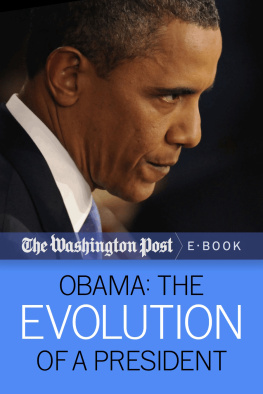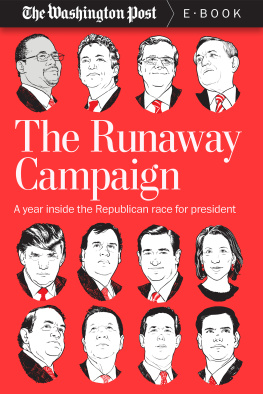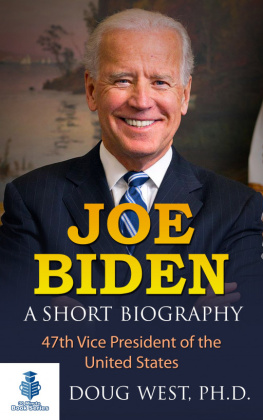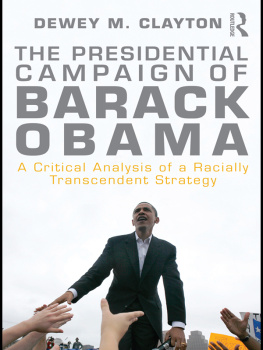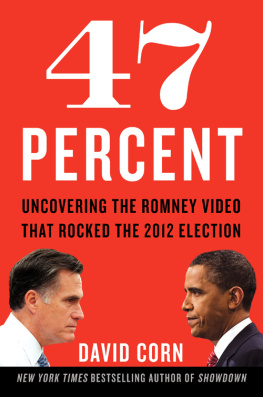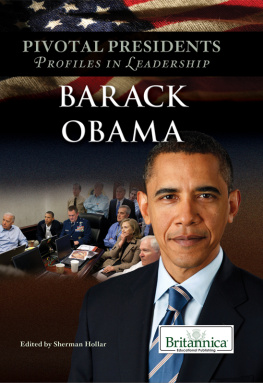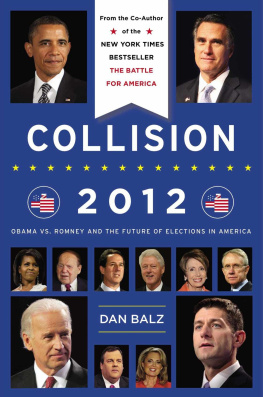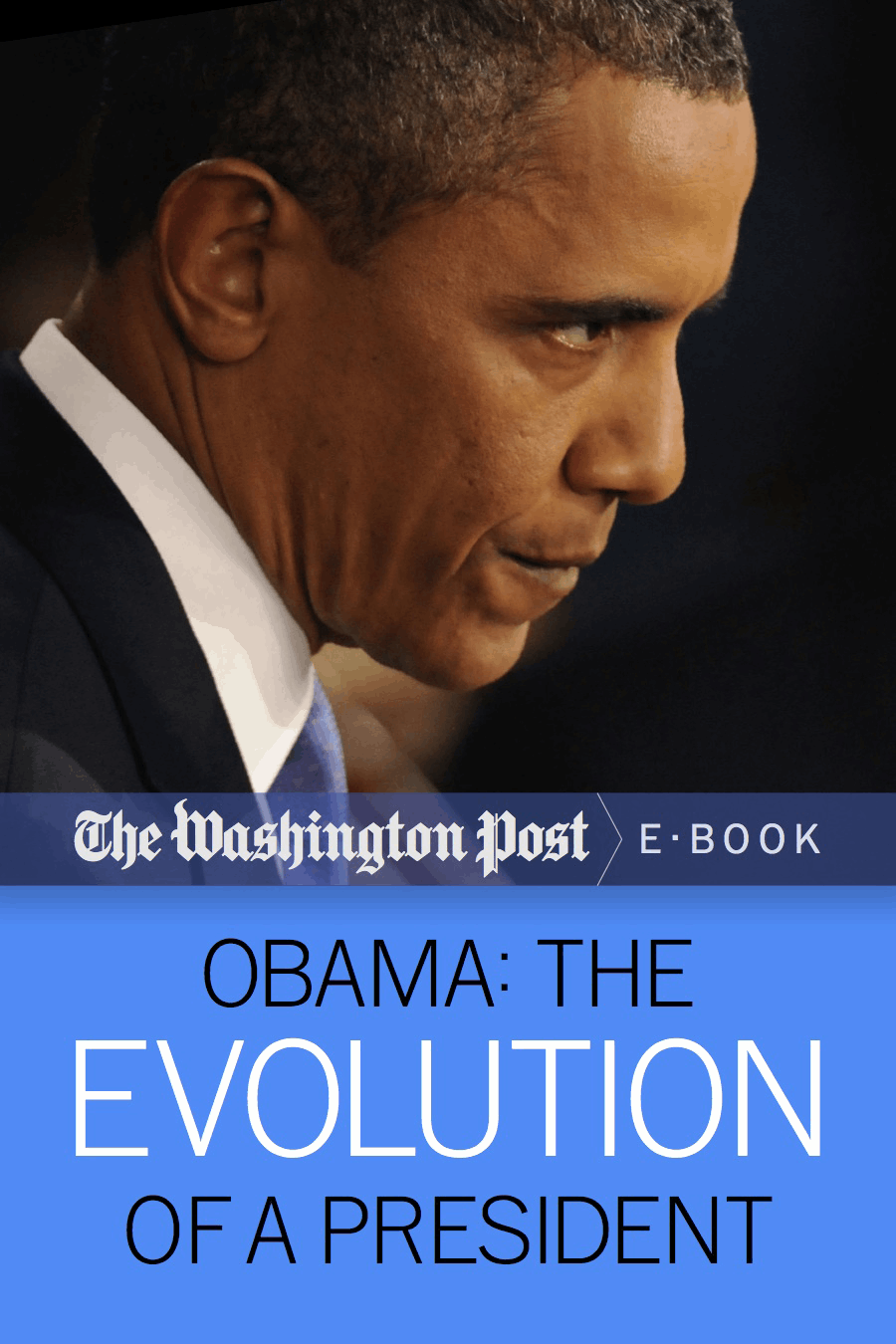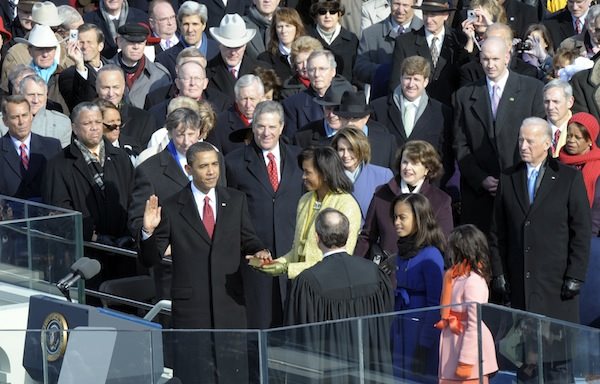All rights reserved, including the right to reproduce this book or portions thereof in any form whatsoever.
For more information, email info@diversionbooks.com.
First Diversion Books edition September 2012.
INTRODUCTION
Barack Obama arrived in Washington in 2008 fully confident he could deliver on the change you can believe in rallying cry of his historic presidential campaign.
In many ways, however, Washington has changed Obama more than Obama has changed Washington.
The most significant change of the last four years may be the evolution that occurred within Obama himself. The idealist of the 2008 campaign has become a hard-nosed pragmatist after a series of bruising battles with Republicans in Congress. The man who once promised a new kind of politics has become a partisan warrior running a bare-knuckles re-election campaign. Its a metamorphosis that has cheered many of his most ardent supporters, who long hoped for a stronger advocate for liberal causes. But it has also disillusioned many Americans who believed he could bring the country together and transform Washington into a place where problem solving overcame party politics.
During his campaign, Obama promised to end the war in Iraq. He pledged to fix the countrys broken health-care system. And in the final weeks of his campaign, he vowed urgently to find the tools to prevent another Great Depression. But more than anything, his aspiration to create a post-partisan politics gave a special lift to his candidacy and created outsize expectations for his presidency.
The call for change, for a new politics shorn of bitterness and red-blue divisions had long been at the heart of Obamas political persona. He wove that message into every important speech of the campaign, from his announcement in February 2007 all the way to his inauguration speech. By then, however, Democrats and Republicans on Capitol Hill were already at odds over an economic stimulus program. Republicans call the stimulus battle the original sin of the Obama presidency. White House officials mark it as the moment when hope and change collided with Republican intransigence.
During his first year in office, Obama saw his approval ratings sink and the loss of the Democrats filibuster-proof 60-seat Senate majority with the triumph of Scott Brown (R) in Massachusetts. But in March 2010, the president managed to rally the troops and pass historic health-care reform legislation expanding coverage to 32 million Americans and outlawing certain insurance company practices like refusing to cover those with preexisting conditions. This is what change looks like, Obama proclaimed post-vote.
But the president headed into 2010 with several hurdles to implementing his legislative agenda, which included a major financial regulatory reform package and a jobs bill. At the start of that year, he assumed a more populist tone and proposed a spending freeze in his 2011 budget for discretionary spending, along with a tax on big banks to calm public furor over large compensation packages.
Though those initiatives seemed designed to channel a middle course, they angered the presidents liberal base, which wanted the public option included in the health-care measure. Obamas left-flank was also irate about a December 2009 decision to send 30,000 additional troops to Afghanistan.
The president paid in the 2010 midterm elections that saw the rise of the tea party and the loss of the House majority to Republicans and the seizing of six Senate seats by the GOP.
Despite those setbacks, the former community activist and one-term Illinois senator has already ushered in change in a variety of ways: through his race as the nations first African-American president, through all the programs launched by his mammoth stimulus bill, through his executive actions on education and immigration and through his potentially revolutionary political tactics that involved reaching out to average citizens through the Internet in unprecedented ways.
His slow evolution on the propriety of gay marriage led to a significant milestone for gay rights.
He has been less successful in shepherding change in the Mideast and Iran, but his administration can point to several successes in foreign policy after four years, including the death of Osama Bin Laden.
But it was his inability to enact transformational change during the debt ceiling negotiations in the summer of 2011 that really changed Obama himself. The actions of Obama and his staff during that period best reflect the grand ambitions and the shortcomings of his entire presidency.
Like earlier policy battles, the negotiations to keep the country from falling off a fiscal cliff revealed a divided figure, a man who remained aloof from a Congress where he once served and that he now needed. He was caught between his own aspirations for historical significance and his inherent political caution. And he was unable to bridge a political divide that had only grown wider since he took office, underscoring the gulf between the way he campaigned and the way he had governed.
In the end, that brief effort not only illuminated pitfalls in the road he had taken during the previous three years but also directed him down a different, harder-edged, more overtly partisan path that is now defining his reelection campaign.
What happened during those days in July when the grand bargain was almost reached, but not quite, changed him for good. He no longer seemed a divided man.
His goal after that summer was unequivocal: to win a second term.
Barack Obama is sworn in as the 44th president by Chief Justice John G. Roberts Jr.
(Photo by Toni Sandys/The Washington Post)
Obama, the loner president
By Scott Wilson
October 7, 2011
Beyond the economy, the wars and the polls, President Obama has a problem: people.
This president endures with little joy the small talk and back-slapping of retail politics, rarely spends more than a few minutes on a rope line, refuses to coddle even his biggest donors. His relationship with Democrats on Capitol Hill is frosty, to be generous. Personal lobbying on behalf of legislation? He prefers to leave that to Vice President Biden, an old-school political charmer.
Obamas circle of close advisers is as small as the cluster of personal friends that predates his presidency. There is no entourage, no Friends of Barack to explain or defend a politician who has confounded many supporters with his cool personality and penchant for compromise.
Obama is, in short, a political loner who prefers policy over the people who make politics in this country work.
He likes politics, said a Washington veteran who supports Obama, but like a campaign manager likes politics, not a candidate. The former draws energy from science and strategy, the latter from contact with people.

